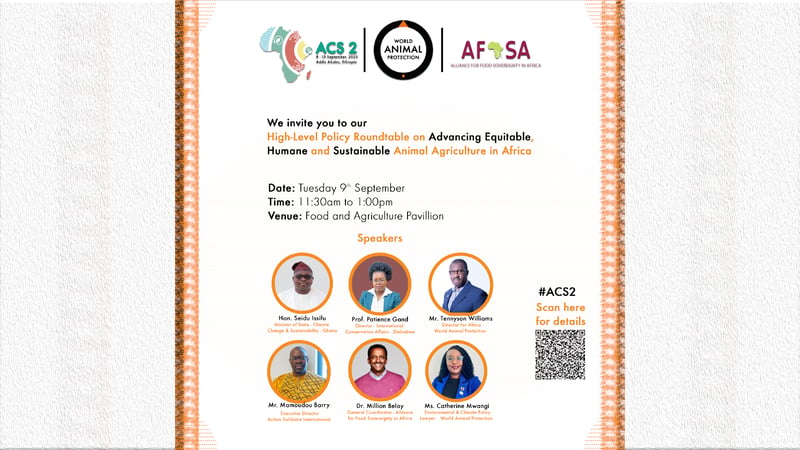
High Level Policy Roundtable on Advancing Equitable, Humane & Sustainable Agriculture
News
Animal agriculture lies at the heart of Africa’s economic and cultural life. From pastoralist communities in the Sahel to mixed smallholder farms across the continent, livestock provides food, income and identity.
Yet the sector faces unprecedented pressure from climate change, corporate consolidation and policy reforms that favour industrial models. The High Level Policy Roundtable on Advancing Equitable, Humane and Sustainable Models of Animal Agriculture in Africa seeks to chart a different path.
Date and Venue
This roundtable is scheduled for 9 September 2025 from 11.30 AM to 1.00 PM Eastern Africa Time. It will take place at the Agriculture & Food Systems Pavilion, of the Africa Climate Summit in Addis Ababa, gathering ministers, senior officials, scientists and civil society leaders.
Why This Roundtable Matters
Industrial livestock systems are expanding rapidly across Africa. These systems often rely on imported feed, high density confinement and heavy antibiotic use. They can displace traditional breeds, degrade land and contribute to greenhouse gas emissions. Conversely, indigenous and smallholder systems are more closely aligned with ecosystems, support biodiversity and are integral to local economies. The roundtable is an opportunity to reassess policy trajectories and amplify African perspectives that prioritise equity, animal welfare and sustainability.
Key Issues on the Agenda
Food Sovereignty and Policy Coherence
Participants will explore how national climate and agriculture policies can be harmonised to support humane farming. This includes recognising communal land rights, maintaining pasturelands and directing subsidies toward smallholders practising agroecology. The conversation will challenge assumptions that industrial models are the only route to food security.
Indigenous Knowledge and Livestock Diversity
African livestock diversity is a reservoir of resilience. Local breeds are adapted to harsh climates, resistant to disease and often managed with deep ecological knowledge. Preserving and promoting this diversity is essential for climate adaptation. Delegates will discuss how policy frameworks can protect indigenous breeds and integrate traditional herding practices into modern strategies.
Regional Cooperation and Global Advocacy
The roundtable aims to create a coalition of governments committed to humane and sustainable animal agriculture. By coordinating positions and sharing best practices, African nations can speak with a unified voice in global negotiations such as the United Nations Framework Convention on Climate Change. This cooperation can also attract funding for research, extension services and value chains that respect animal welfare.
Expected Outcomes
By the end of the session, attendees aim to agree on a set of policy recommendations that can be taken forward at national and international levels. These may include commitments to halt deforestation linked to animal feed, promote agroecological research, protect indigenous breeds and embed animal welfare in climate strategies. The roundtable will also identify opportunities for joint advocacy and funding.